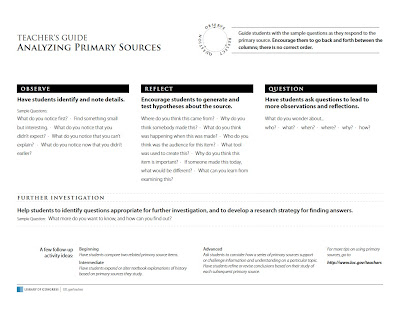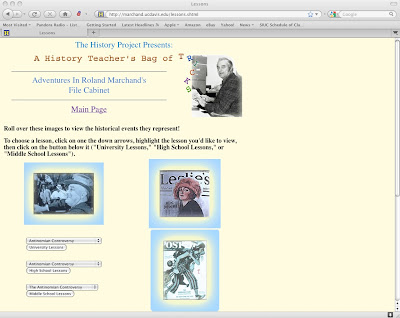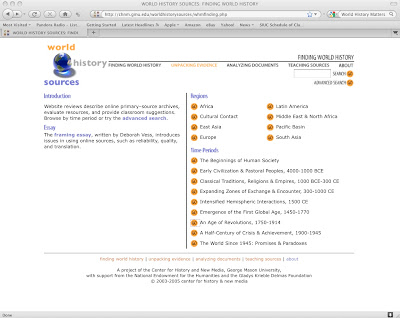Social Sciences
It's that time of the semester when my students are hurriedly (and thoughtfully, I hope) developing lessons and units with primary sources. Of course, any web search will yield millions of hits, but finding and organizing these sources into a thoughtful, coherent way is critical. Fortunately, there are several resources out there to help.
Analyzing Sources
The Library of Congress has a number of guides to help students analyze sources. The document below details a three-step process: 1) Observe, 2) Reflect, and 3) Question. This is similar to other curricula that emphasize Literal (What do you see?), Interpretive (What does it mean?), and Contextual (How does it reflect a time or place?) questions.

via Library of Congress Teaching Guides
These steps align quite nicely with the Media Literacy Questions and Historical Thinking Heuristics I have mentioned in previous posts. (Click on the hyperlinks to see these posts.) That is, students can ask, "What creative techniques are used to influence my opinion?" (Media Literacy) or, "Who created this source?" (Sourcing Heuristic).
Of course, students should consider different types of questions for different types of sources. For specific types of sources, the Library of Congress also offers invaluable Document Analysis Sheets to help students analyze written documents, photographs, cartoons, posters, maps, artifacts, motion pictures, and sound recordings. Of course, these activity sheets could be adapted to meet the needs of any particular lesson. George Mason University also provides guides for analyzing sources such as images, objects, maps, music, newspapers, official documents, personal documents, and travel narratives. This site also provides examples of how scholars analyze these various sources.

via The History Project
Lesson Ideas
Speaking of lessons, if you need a jump start for ideas, the Library of Congress also offers lesson ideas using documents. These are organized by topic for American history. Another collection of documents readily available for American history topics is Roland Marchand's "A History Teacher's Bag of Tricks." Lessons range from topics related to Colonial America to Watergate. What's particularly helpful about this site is that the lessons include ideas for essential/critical/central questions and excerpts of sources related to specific inquiries. Granted, no historian would limit her search to the set of artifacts neatly packaged for her review; however, for the student, these "bracketed" lessons can serve as an appropriate introduction to analyzing and corroborating sources.
Gathering Sources
One site of particular note offers links to myriad sources. The Finding World History link from the George Mason University site mentioned above has history resources organized by regions and time periods. The emphasis here is World History, so searches for conventional U.S. History resources need apply elsewhere. An example of an exception is under the category "Cultural Contact," which includes links to 63 websites, including a link to one devoted to the slave narratives. In other areas, you can find over 100 sites devoted to this history of Industrialization. Each site is annotated with a review of what's offered in terms of primary sources and background. In a word, this resource is a gem.

- Don't Buy A Textbook
Stanford History Education Group's Reading Like a Historian I recently received an email from a Superintendent in Massachusetts. It was time to buy an American history textbook series, and he wanted to know if I had any suggestions. My quick answer...
- Examining Photographs: "migrant Mother"
Cover Image via NPR.org Analyzing Photographs In previous posts, I have identified resources that help students analyze images through the lens of media literacy. A recent NPR Morning Edition interview with the author of the new book Dorothea Lange: A...
- New York State Archives - Throughout The Ages
New York State Archive Last weekend, I attended and presented at the National Council for the Social Studies Annual Meeting in Atlanta, GA. I was more than impressed with the variety of sessions I attended and the generous vendors at the exhibition hall....
- Teaching With Political Cartoons
Political cartoons show up a lot in social studies curricula, including textbooks, worksheets, and now standardized state and national exams. In these cases, students are asked to analyze the cartoon's content or the cartoonist's point of view....
- Historical Thinking Matters
One of the best free Websites available that adequately scaffolds students' evaluation, corroboration, and synthesis of multiple conflicting sources (yes, the full package of historical thinking) is Sam Wineburg's recent digital project, Historical...
Social Sciences
Primary Sources, Primary Sources, Primary Sources...
It's that time of the semester when my students are hurriedly (and thoughtfully, I hope) developing lessons and units with primary sources. Of course, any web search will yield millions of hits, but finding and organizing these sources into a thoughtful, coherent way is critical. Fortunately, there are several resources out there to help.
Analyzing Sources
The Library of Congress has a number of guides to help students analyze sources. The document below details a three-step process: 1) Observe, 2) Reflect, and 3) Question. This is similar to other curricula that emphasize Literal (What do you see?), Interpretive (What does it mean?), and Contextual (How does it reflect a time or place?) questions.

via Library of Congress Teaching Guides
Of course, students should consider different types of questions for different types of sources. For specific types of sources, the Library of Congress also offers invaluable Document Analysis Sheets to help students analyze written documents, photographs, cartoons, posters, maps, artifacts, motion pictures, and sound recordings. Of course, these activity sheets could be adapted to meet the needs of any particular lesson. George Mason University also provides guides for analyzing sources such as images, objects, maps, music, newspapers, official documents, personal documents, and travel narratives. This site also provides examples of how scholars analyze these various sources.

via The History Project
Lesson Ideas
Speaking of lessons, if you need a jump start for ideas, the Library of Congress also offers lesson ideas using documents. These are organized by topic for American history. Another collection of documents readily available for American history topics is Roland Marchand's "A History Teacher's Bag of Tricks." Lessons range from topics related to Colonial America to Watergate. What's particularly helpful about this site is that the lessons include ideas for essential/critical/central questions and excerpts of sources related to specific inquiries. Granted, no historian would limit her search to the set of artifacts neatly packaged for her review; however, for the student, these "bracketed" lessons can serve as an appropriate introduction to analyzing and corroborating sources.
Gathering Sources
One site of particular note offers links to myriad sources. The Finding World History link from the George Mason University site mentioned above has history resources organized by regions and time periods. The emphasis here is World History, so searches for conventional U.S. History resources need apply elsewhere. An example of an exception is under the category "Cultural Contact," which includes links to 63 websites, including a link to one devoted to the slave narratives. In other areas, you can find over 100 sites devoted to this history of Industrialization. Each site is annotated with a review of what's offered in terms of primary sources and background. In a word, this resource is a gem.

via George Mason University's Finding World History
- Don't Buy A Textbook
Stanford History Education Group's Reading Like a Historian I recently received an email from a Superintendent in Massachusetts. It was time to buy an American history textbook series, and he wanted to know if I had any suggestions. My quick answer...
- Examining Photographs: "migrant Mother"
Cover Image via NPR.org Analyzing Photographs In previous posts, I have identified resources that help students analyze images through the lens of media literacy. A recent NPR Morning Edition interview with the author of the new book Dorothea Lange: A...
- New York State Archives - Throughout The Ages
New York State Archive Last weekend, I attended and presented at the National Council for the Social Studies Annual Meeting in Atlanta, GA. I was more than impressed with the variety of sessions I attended and the generous vendors at the exhibition hall....
- Teaching With Political Cartoons
Political cartoons show up a lot in social studies curricula, including textbooks, worksheets, and now standardized state and national exams. In these cases, students are asked to analyze the cartoon's content or the cartoonist's point of view....
- Historical Thinking Matters
One of the best free Websites available that adequately scaffolds students' evaluation, corroboration, and synthesis of multiple conflicting sources (yes, the full package of historical thinking) is Sam Wineburg's recent digital project, Historical...
